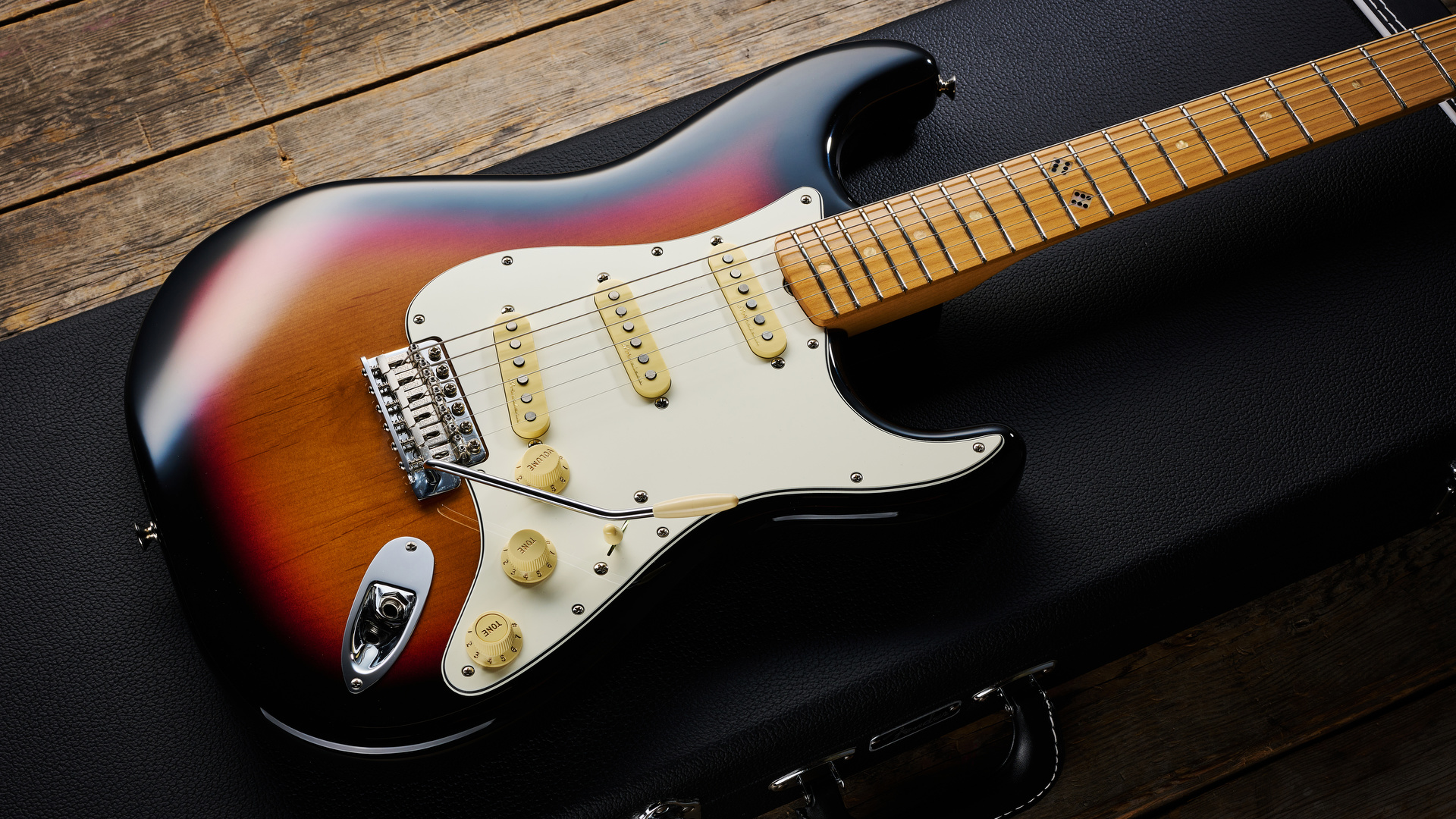MusicRadar Verdict
Pros
- +
A killer fuzz circuit – in a Strat!
- +
The finish is a fresh take on tradition
- +
Fender's Player Strat platform impresses again
Cons
- -
Truss rod nut adjustment requires the neck to be removed
- -
Fret markers are not as easy to read as traditional black ones
- -
The fuzz control doesn't clean it up, just lowers volume
MusicRadar's got your back
Fender Steve Lacy People Pleaser Stratocaster: What is it?

The Fender Stratocaster: one of the most distinctive pieces of design ever, not just in music but anywhere. It endures, but it also evolves. For every player hooked on the golden era authenticity of the Strat's '50s and '60s specs, there's a potential customer waiting for one with an unexpected feature to win them over. And sometimes it takes players themselves to make that happen.
Grammy Award-winning musician and producer Steve Lacy steps up to take the Strat into a new chapter; where it gets a fuzz circuit built-in. It's as unexpected as the twists and turns in Lacy's artistic moves. They have seen him as part of LA-based R&B band the Internet in his teenage years, to recording solo songs on an iPhone with an iRig, and producing other visionary artists including Kendrick Lamar, J Cole and Denzel Curry.
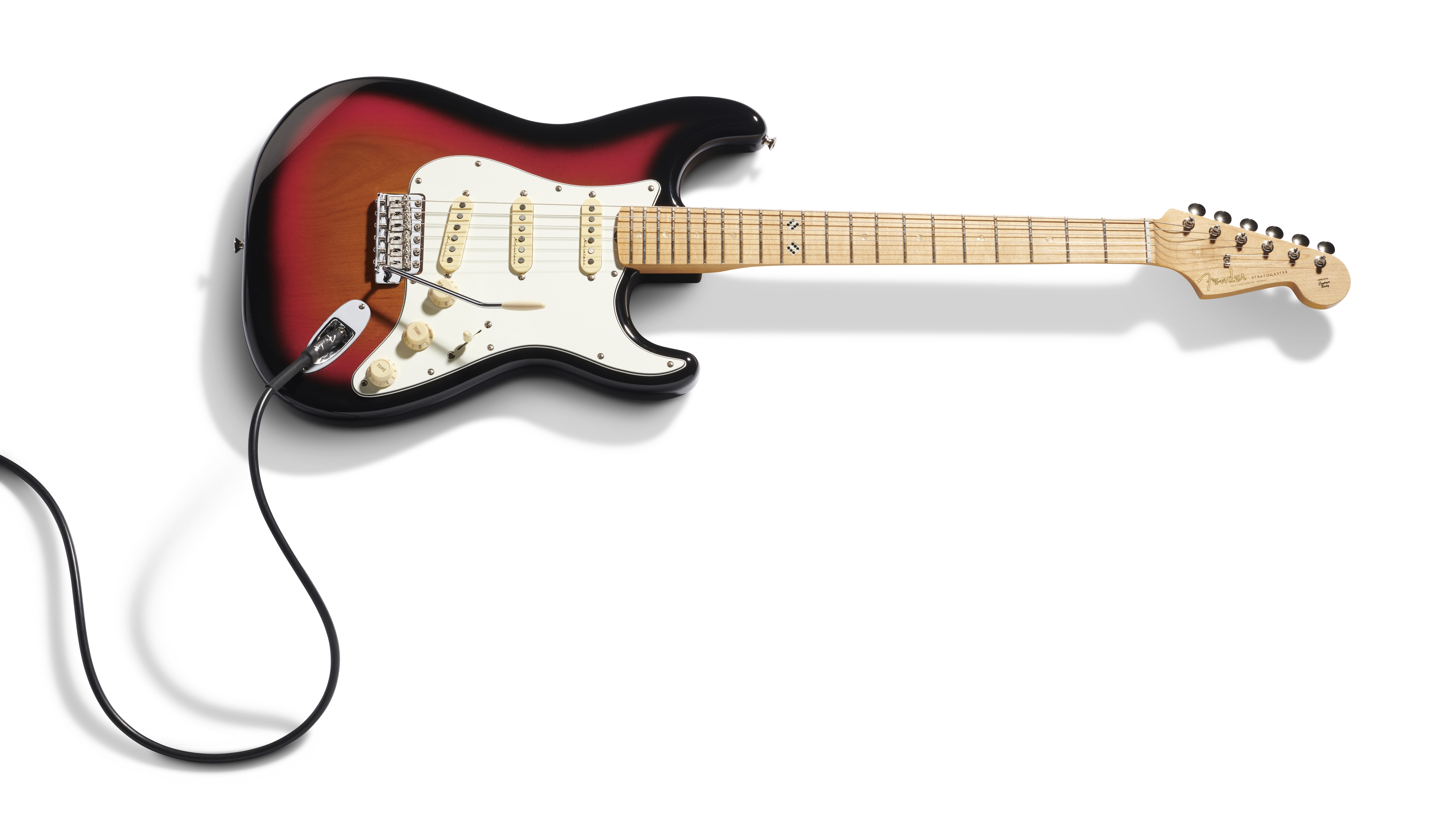
Lacy layers the influence of indie, R&B and good 'ol rock solos into the kaleidoscope of his music and the Strat offers the versatility for this kind of movement. Visually there's plenty of personal touches that give his new signature guitar distinction too – stemming from Lacy's desire to "mix the old with the new" for the guitar, as he told us recently, that's reflective of his general modus operandi as an artist.
Fender Steve Lacy People Pleaser Stratocaster: Performance and verdict
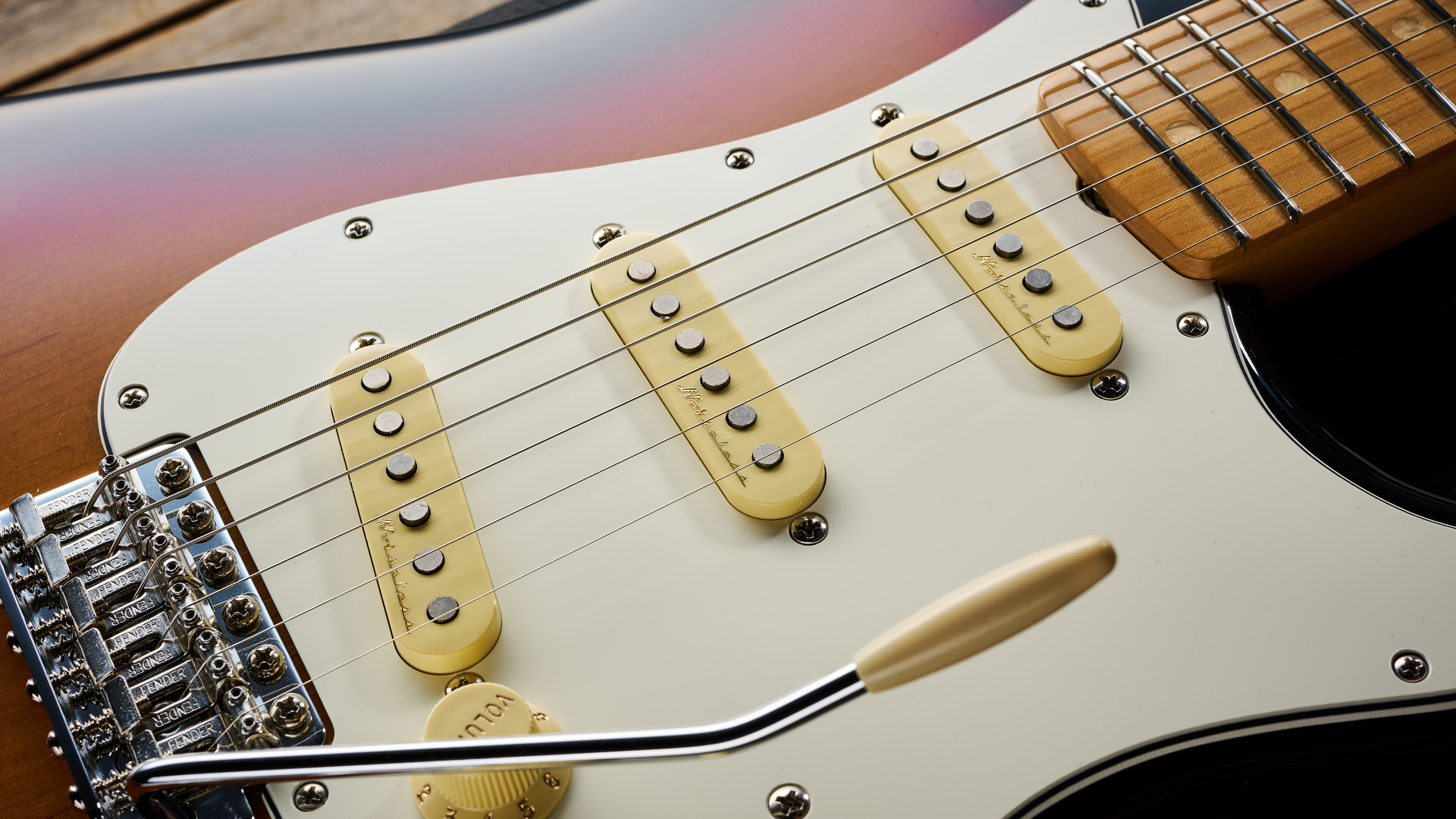
The finish here is a great example of that; in some lights and at first glance it could be a 3-colour Sunburst. But the hues of pink add a twist in its Chaos Burst that's executed on the classy side of subtle.
It's not a lightweight Strat, though 8.2lbs it's pretty average for an alder body example these days.
The overall build is reassuring with no obvious fret issues. While the fingerboard edges do seem to have a subtle rolling treatment to them, it's not as tangible as we encountered on the Player Plus Strat – of which this shares the same pickup spec.
Much more frustrating is that Fender and Lacy have opted for a vintage-style trussrod nut at the base of the neck, requiring the neck bolts to be loosened significantly to make any adjustments. Yes, that means loosening the strings and all that fandango every time you need to make slight adjustments to your truss rod. Whether it was Lacy's decision influenced by the aesthetic of his favoured '60s vintage Strats, or if Fender made another decision like they did with the recent Gold Foil Jazzmaster isn't clear. But for practical reasons, we're not fans of it.
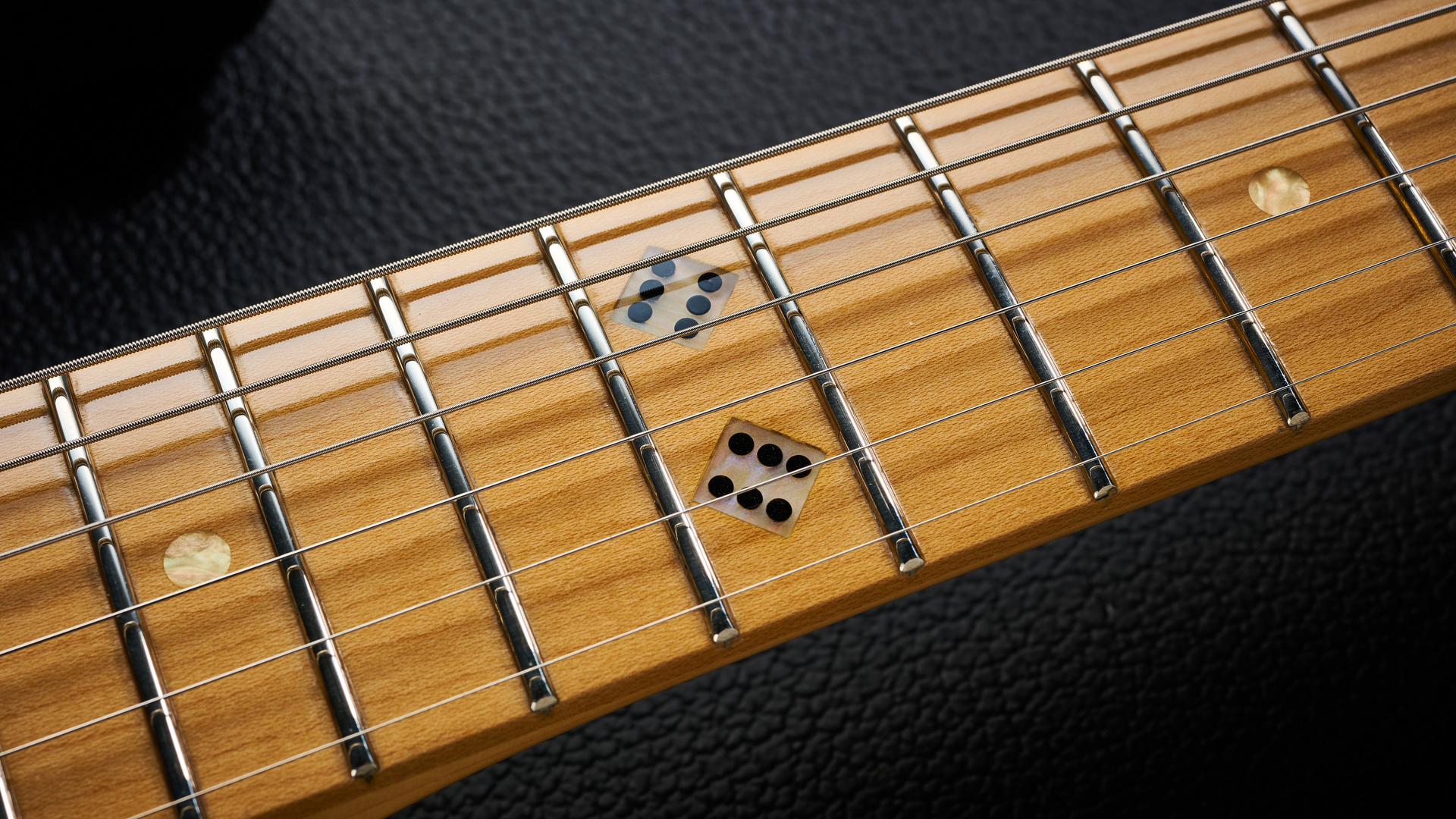
Lacy's aesthetic touches beyond the finish include a double-six dice inlay at the 12th fret, signature on the back of the headstock, yellow and green checkerboard tremolo cavity cover and Lacy's cartoon face sketch on the neck plate. Only one affects the real-world playing experience…
The decision to use white pearl fret markers that are much more stealth-like on the maple board than the usual black. It certainly makes those fetching dice inlays pop a little more but for some players, not having clearer visual cues as to where they are on the fretboard – especially in lower light – could be an issue.
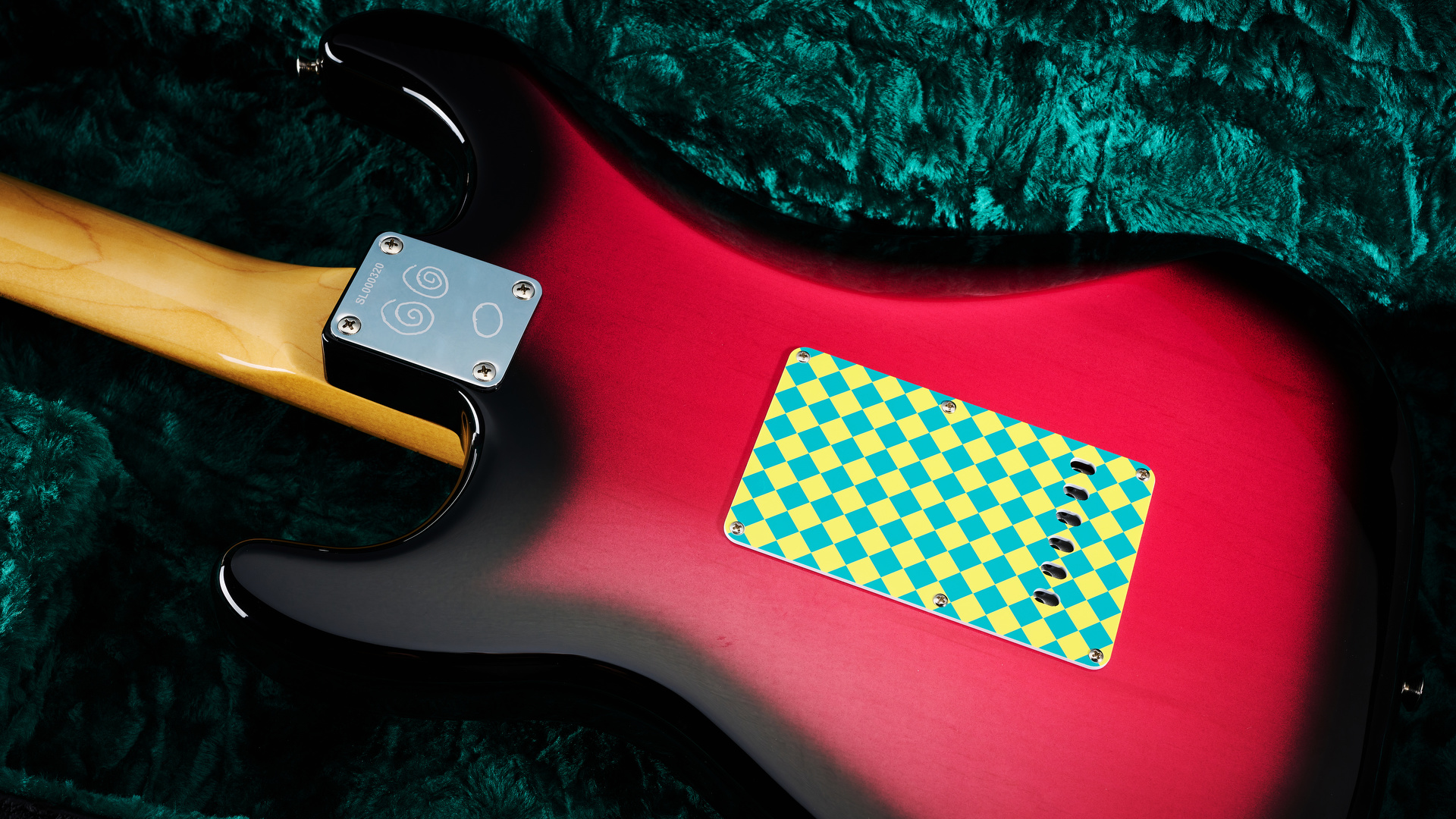
It always strikes us just how varied Fender's C-shape necks can be, and here we have a meatier 'deep' carve that could win some vintage Strat fans over. It really has to be tried to know if it works for you, but fear not; it's no baseball bat opinion divider. It encouraged us to dig in a little deeper, but the friendly low action here left a positive impression when it came to out-of-the-box playability.
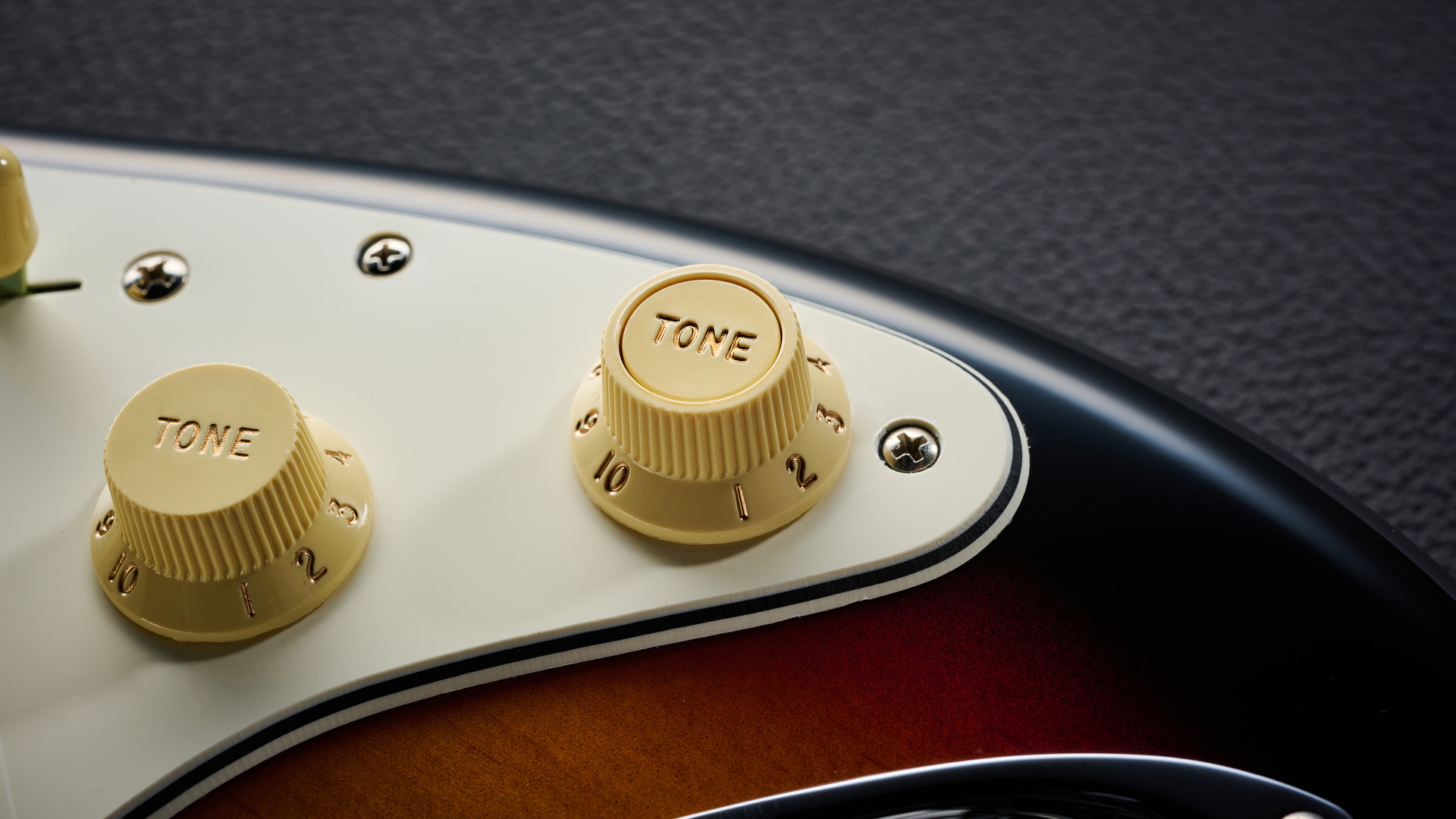
We're itching to plug in and try that fuzz circuit. But when we do we're greeted with some crackling when we touch its control, and infrequent cutting out of the signal. Time to get the electrical contact cleaner out and a quick spray on the top inside edge of the pot after taking the scratchplate off (the rest of the fuzz circuit is inside a protective cover) and it's sorted. So I'll be giving Fender QC the benefit of the doubt on this one.
Fuzz engaged and it's apparent just how the Strat can continue to surprise. It's certainly a fresh feature to have onboard. There's something to be said for guitar-based effect activation when it comes to transitions for some players, others will fall firmly on the fuzz pedal side. But this pedal's fuzz thrills make a strong case.
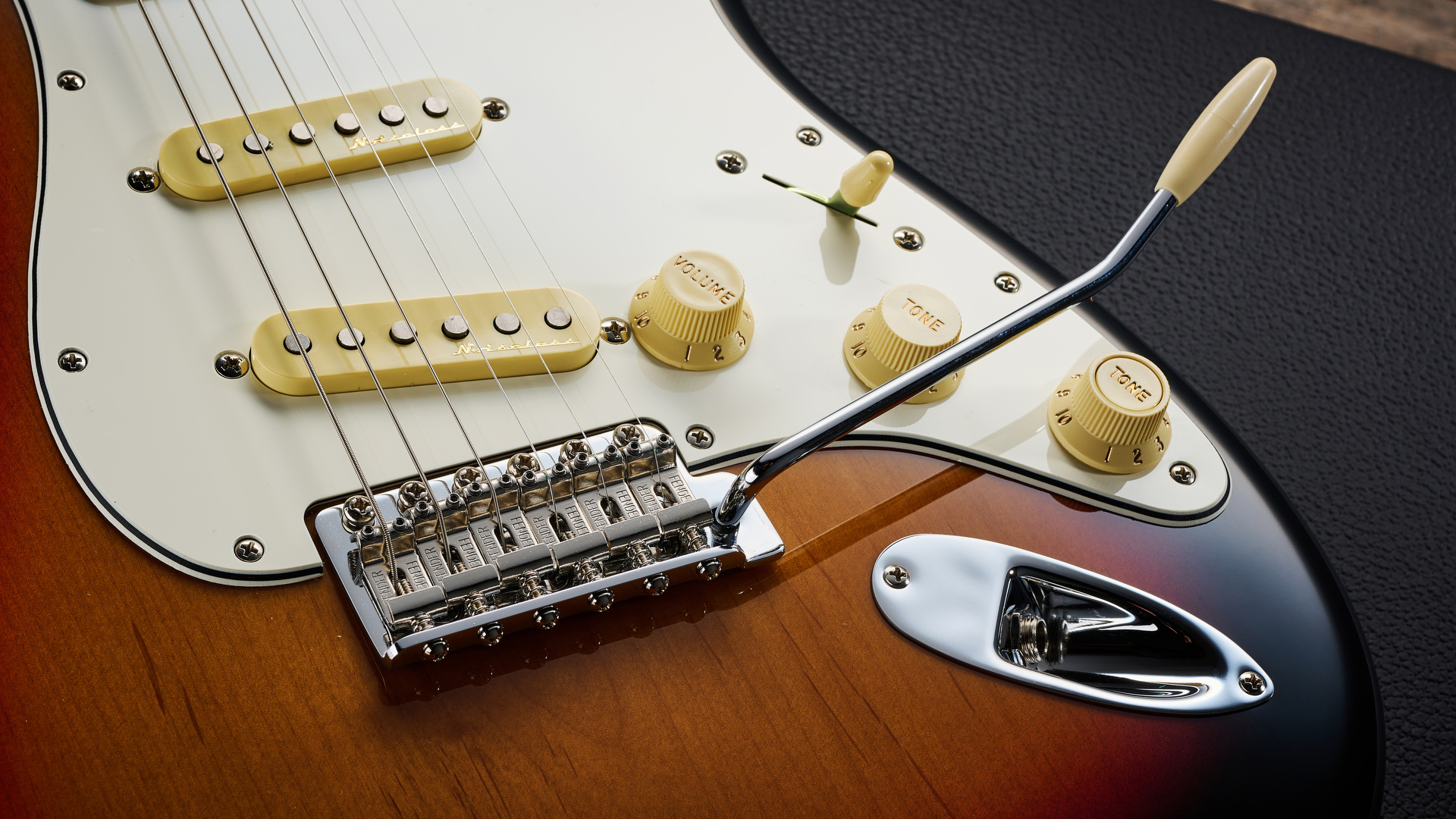
The Steve Lacy Strat's active circuit is a very usable and adaptable fuzz; throaty in the low end and sustaining without getting wooly or overtly metallic. That's because it's a bit more on the Pro Co Rat distortion side of things to my ears. It also stacks well with our Klon and Tube Screamer in testing. It's a lot of fun; great for leads and big riffs, without getting finicky. I'm going to stick my neck out and say this might win a few fuzz naysayers around.
While the S-1 switching that engages it is marked Tone, in Strat tradition, it's actually not a tone control at all; it controls the fuzz volume when engaged. This can then be balanced with the other volume control for your cleaner sound. The middle Tone knob is therefore a master tone control.
The Fender Noiseless pickups are the right choice here as they do a good job of keeping this gainsome setup from entering the wrong side of wild in terms of hum
There's a downside; that volume for the fuzz merely turns it down, it doesn't clean it up. If it did, it would have widened the use potential of the active circuitry here even further. That may well disappoint some fuzz fans.
The Fender Noiseless pickups are the right choice here as they do a good job of keeping this gainsome setup from entering the wrong side of wild in terms of hum. They're not to some vintage tastes but there is no definitive 'Strat' sound; only variations on it. Fender's Noiseless pickups represent a great platform for effects for the stage, and with much less of the extraneous noise that can frustrate players recording at home.
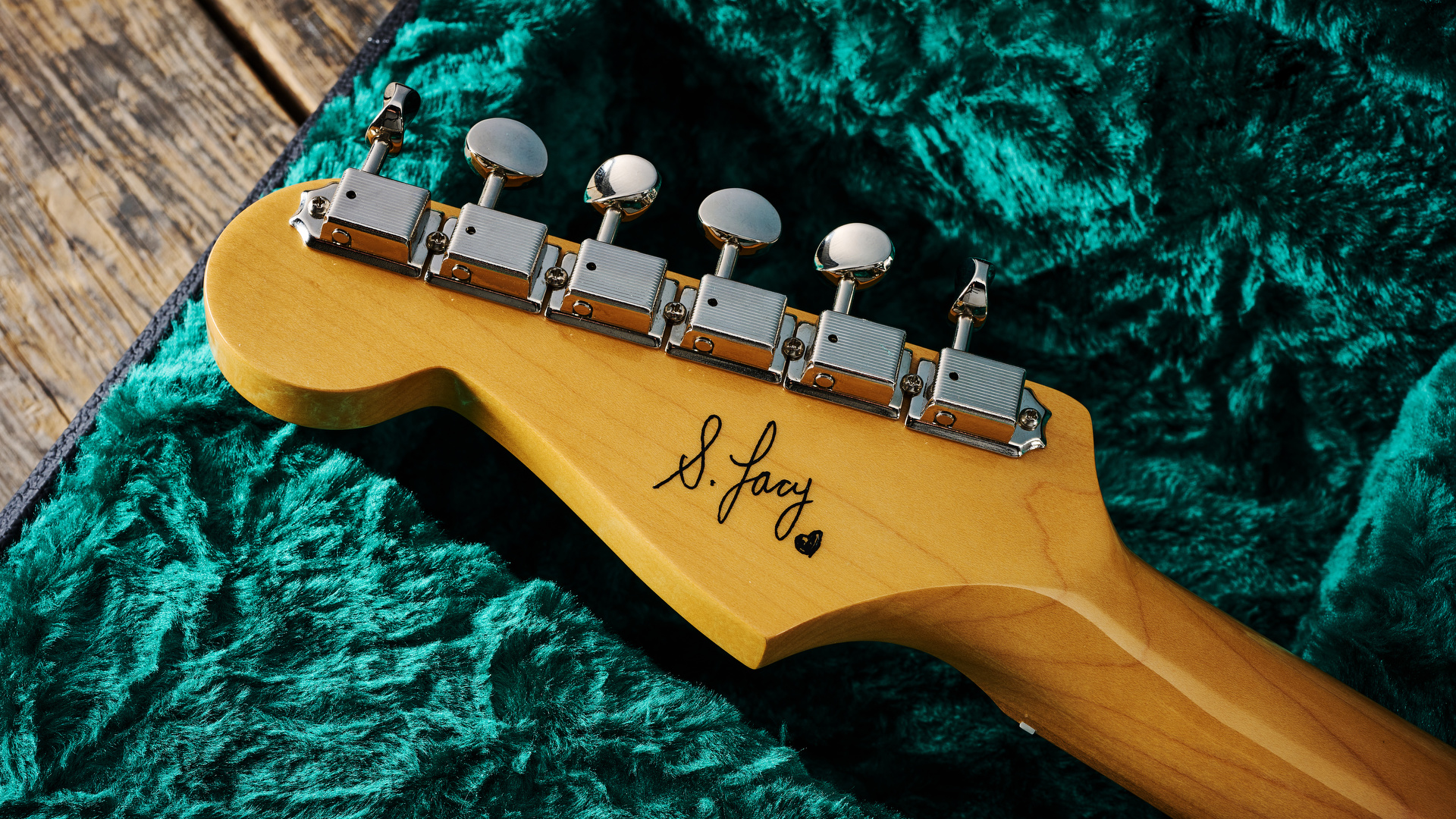
The aesthetics here are a secondary appeal next to the unique UPS of a fuzz circuit in a stock Fender guitar, and the combination demands a premium of around $300 street over a Player Plus Strat right now – though that offers the option to combine the neck pickup to two positions that this doesn't. But consider what it might cost to have a fuzz circuit professionally installed in a Player Plus Strat, even you could find someone to do it if you won't and the results sound as good as this. The package checks out as a fair comparative cost in the Mexican Fender line to me.
MusicRadar verdict: Thanks to Steve Lacy's input, the built-in fuzz circuit here adds a new twist to the Strat legacy – and a very enjoyable fuzz it is too. A pleasing guitar package indeed.
Fender Steve Lacy People Pleaser Stratocaster: Hands-on demos
Fender (featuring Steve Lacy's first guitar teacher Jairus 'JMO' Mozee)
Reverb
Fender Steve Lacy People Pleaser Stratocaster: Specifications
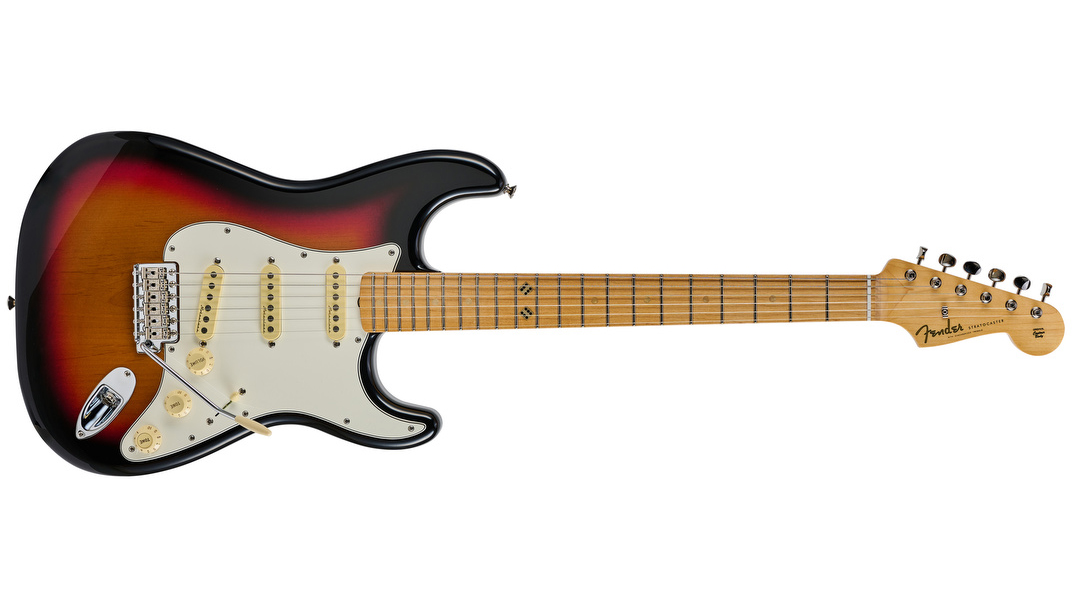
- TYPE: Solid-body electric, made in Mexico
- BODY: Alder, gloss urethane finish
- NECK: Maple 'Deep C-shape, bolt-on
- SCALE: 25.5”
- FINGERBOARD: Maple, 9.5" radius
- FRETS: 21, Narrow Tall
- ELECTRICS: 3 x Fender Player Plus Noiseless Strat single-coil pickups with five-way blade selector, Custom-Voiced Steve Lacy Chaos Fuzz (powered by nine-volt battery)
- CONTROLS: 1x volume, 1x tone, 1x fuzz output volume with S-1 Switch to activate fuzz circuit
- HARDWARE: Six-saddle vintage-style synchronized tremolo with bent steel saddle. Fender vintage-style tuning machines, custom neck plate with Steve Lacy artwork
- WEIGHT: 8.2lbs / 4.2kg
- CASE: Vintage-style hardcase
- FINISHES: Chaos Burst
- CONTACT: Fender

Rob is the Reviews Editor for GuitarWorld.com and MusicRadar guitars, so spends most of his waking hours (and beyond) thinking about and trying the latest gear while making sure our reviews team is giving you thorough and honest tests of it. He's worked for guitar mags and sites as a writer and editor for nearly 20 years but still winces at the thought of restringing anything with a Floyd Rose.
“We were arguing a lot and we were miserable”: How Green Day exceeded expectations with their most ambitious song
"There’s plenty for us guitarists to learn – and ‘less is more’ is the overriding lesson": how to play like George Harrison on The Beatles' Abbey Road
“They didn’t like Prince’s bikini underwear”: Prince’s support sets for the The Rolling Stones in 1981 are remembered as disastrous, but guitarist Dez Dickerson says that the the crowd reaction wasn’t as bad as people think
